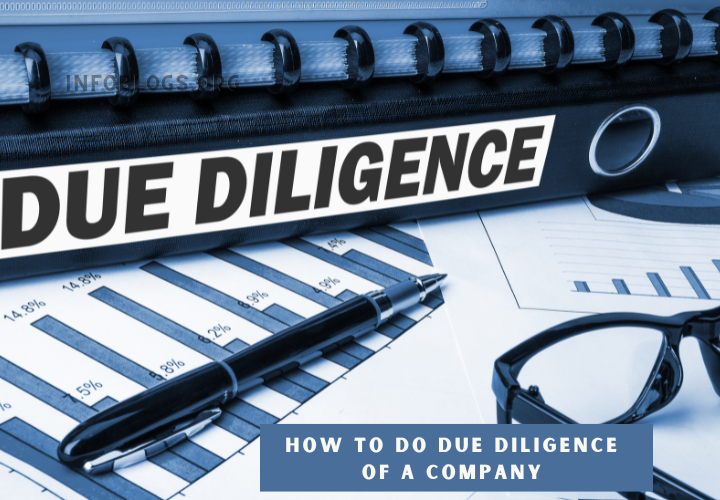In today's article let us see how to conduct due diligence of a company.
Due diligence is an essential process for any business looking to invest in a company or venture. It allows them to assess the potential risk and reward of their investment, as well as giving them a better understanding of the company they are considering investing in. However, due diligence can be a complex and time consuming process that requires significant research and analysis. Knowing how to do due diligence correctly is an important skill for any investor or entrepreneur, so this article will examine key steps in the process and provide useful tips on how best to perform due diligence on a company. Let's go one by one on the key points.
Financial Analysis
In order to do due diligence of a company, one must perform financial analysis before making any investment decision. Financial analysis involves evaluating the financial statements and performance of a company in order to assess whether it is worth investing in. This process starts with examining the balance sheet, income statement and cash flows of the company. It also requires looking at the key metrics such as total revenue growth, profitability ratios, leverage ratio, liquidity position and debt-to-equity ratio. By analyzing these figures and comparing them with those from similar companies, potential investors can get an idea of how well the business is doing financially.
Legal Overview
Due diligence being an essential step in the process of acquiring a company, legal analysis is a fundamental component. Conducting due diligence requires a thorough investigation of the target company’s business operations and financial statements to ensure that there are no hidden risks or liabilities. To do this, you must understand the legal requirements associated with the transaction, as well as any potential risks related to financing, taxation, contracts and environmental regulations.
Legal analysis is a key part of due diligence that involves reviewing all relevant documents such as shareholder agreements, franchise agreements and intellectual property rights. Analyzing these documents requires an understanding of relevant laws and regulations that could potentially impact the transaction. This includes researching applicable statutes and court precedents to ensure compliance with local laws.
Competitor Research
Competitor research is an essential part of due diligence for any company. It can help to identify industry trends, emerging technologies, and potential new entrants into the marketplace. By conducting a thorough competitive analysis, companies can gain valuable insight into their own operations and performance as well as that of their competitors.
Understanding how competitors operate can be a powerful tool when performing due diligence. It can inform decisions around pricing strategy, product development, marketing efforts and customer service initiatives. Additionally, competitor research provides organizations with insight into what their peers are doing in terms of financial performance and investment strategies. By staying up-to-date on industry developments and analyzing the competition carefully, organizations can avoid costly missteps and make informed decisions about the future of their business.
Management Review
Management review is a critical part of due diligence when researching a company. It involves taking a close look at the internal management structure and operations, in order to identify possible risks and concerns that could impact the value of the business. Understanding the capabilities of your target company's leadership team is essential for any investor or potential buyer.
To conduct an effective management review, it is important to assess key aspects such as experience, track record, qualifications, relationships with other industry stakeholders and more. This can be done through interviews with current staff members and stakeholders, financial analysis of past performance data and reviews of existing policies or procedures that may be beneficial or detrimental to future growth. Additionally, investors should also consider external factors such as industry trends or competitive pressures that could influence success in the near future.
Market Assessment
Market assessment is an important part of due diligence when looking at a company. It involves taking the time to analyze and evaluate the current economic environment and its implications on the success of the organization. Market assessments provide insight into the external factors which can affect a company's operations, such as competition, customer base, pricing strategies, and market trends. Understanding these dynamics allows investors to make informed decisions about potential investments in a company.
When assessing the market conditions for a company, it is important to look beyond just financial performance indicators such as sales and profits. A thorough analysis should include an examination of competitors’ pricing strategies, customer service levels, product offerings, new technologies being implemented by other companies in their industry segment and any other relevant information that could impact the business’s operations or profitability.
Conclusion
The conclusion of due diligence when assessing a company can be the difference between making a profitable investment and losing money. Practicing due diligence is an important step in business that should not be overlooked or taken lightly. While the process may seem tedious and time consuming, it is essential to know all that you can about the company before investing your hard-earned capital.
By taking the appropriate steps in due diligence, investors are able to make more informed decisions about their investments. An investor's research should include an analysis of the company's financial statements and legal documents as well as interviewing people who work for or have knowledge of the company's operations and history. Through this process, investors can uncover potential risks that may otherwise remain hidden from plain sight which can help them make more educated decisions about their investments.


